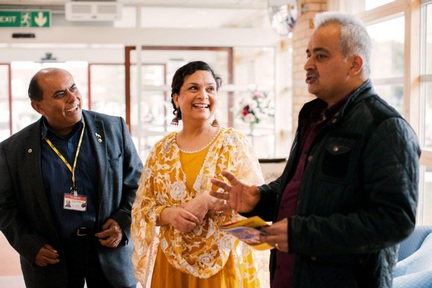Researchers explore why minority ethnic patients access end of life care less
Health professionals in Leicester are pioneering a new approach to end-of-life care for black, Asian, and minority ethnic (BAME) communities after recent research showed they access end-of-life care less and clinicians are not as confident in supporting them.

By undertaking a major new study, LOROS Hospice and Leicester’s Hospitals are trying to find out why BAME communities are accessing end-of-life care services less than other patients, and at a later stage when interventions then become necessary.
This is even though the government has pledged a high standard of end-of-life care for all patients, regardless of their background.
The 30-month-long study, entitled, ‘Thinking Ahead: Exploring and understanding experiences and decisions in end-of-life care for people from minority ethnic communities’ is supported by a grant of £417,000 from the National Institute for Health Research (NIHR).
Professor Christina Faull, lead researcher at LOROS, said: “People from black, Asian, and minority ethnic communities tend to access end of life care services less than other patients. We want to find out more about people’s experiences, the choices that they are offered and decisions that they make. We will use our findings to train doctors and nurses in how to support patients in line with their spiritual and cultural approach to thinking ahead about the end of life.”
The aim of the research is to investigate how the understanding of individual belief systems can enable better end-of-life care. Although the project is specific to the Leicestershire area, the study is the first of this scope in the UK and could provide best practice guidelines for the rest of the country.
The study will start in November, with LOROS researchers participating with colleagues from Leicester’s hospitals, the University of Leicester, general practices, hospices, community trusts and clinical and academic staff from University of Nottingham and the Open University.
Professor Simon Conroy, professor of geriatric medicine at the University of Leicester, said: “Planning is an important part of making sure people can be cared for in the way and in the place they prefer.
“But we know little about how current end-of-life practice fits with communities’ values and beliefs. This study will start to fill those gaps, provide insights that can improve training of clinical staff and ultimately improve care.”
Dipti Patel, a member of the study’s consultation group, said: “The research will hopefully raise awareness of this sensitive topic in these communities and benefit patients in the way of appropriate care. It should also help inform those around them such as carers and families.”
Latest News
 29-Jul-24
Dementia Bus gives carehome.co.uk staff insight into life with dementia
29-Jul-24
Dementia Bus gives carehome.co.uk staff insight into life with dementia
 01-Mar-24
Find out the top care homes in 2024
01-Mar-24
Find out the top care homes in 2024
 21-Mar-23
UK's top care homes in 2023 revealed
21-Mar-23
UK's top care homes in 2023 revealed
 03-Jan-23
carehome.co.uk launches free care helpline
03-Jan-23
carehome.co.uk launches free care helpline
 13-Dec-22
5 mins with Emily Whitehurst, chief operating officer for Constantia Healthcare
13-Dec-22
5 mins with Emily Whitehurst, chief operating officer for Constantia Healthcare